arunca praf în ochi chestionar Situatie split verb forms cascadă
More verb past tense. Seek. Sell. Send. Sew. Shake. Saw is the past tense of the word see. Seen is the past participle of the word see. see past form, verb forms, v1v2v3, Infinitive.

Image result for simple past and past participle list Irregular verbs
Verb Tenses Past simple — see in past simple saw, saw (V2) . Future simple — see in future simple is see (will + V1) . Present Perfect — see in present perfect tense is seen (have/has + V3) . Past Perfect — see in past perfect tense is seen (had + V3) . see regular or irregular verb? 👉 Is 'see' a regular or irregular verb?

Past Tense Of See, Past Participle Form of See, V1 V2 V3 Lessons For
See means; Perceive with the eyes; discern visually Synonym Words With See discern perceive glimpse catch a glimpse of get a glimpse of spot notice catch sight of sight understand grasp comprehend follow take in realize Example Sentences with See I'll see you at 2:30. My father saw the news. I have seen a UFO. I see the problem.
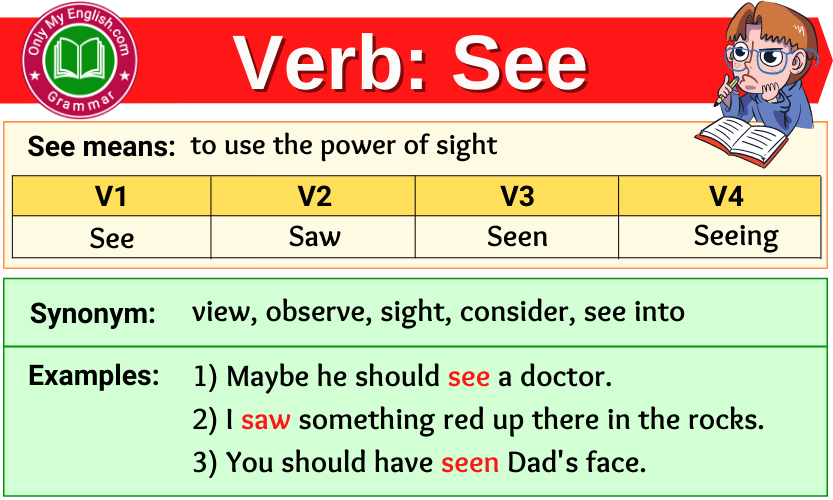
See Verb Forms Past Tense, Past Participle & V1V2V3 »
See V1 V2 V3 V4 V5, Past Simple and Past Participle Form of See Verb; See Meaning; view, observe, sight, consider, see into V1, V2, V3, V4, V5 Form of See Base Form Past Form Past Participle see saw seen Base Form s/es/ies ing Form see sees seeing Synonym for See view observe sight consider see into understand figure out sense grasp fathom look look at overlook take a look at discuss meet talk.

Image result for present participle examples list Grammar lessons
infinitive: present participle: past participle: (to) see se eing se en definition in Spanish in French in Italian Indicative Perfect tenses Continuous (progressive) and emphatic tenses Compound continuous (progressive) tenses Conditional Imperative Subjunctive *Blue letters in conjugations are irregular forms. ( example)

50 examples of present tense past tense and past participle V1, V2 and
⚡ Conjugation of the English irregular verb, past tense : 茶 see saw seen - LEARN IV.com Learniv.com > en. The past participle is one of the most important parts of English grammar. It's used to express perfect tenses and to form the passive voice. It's also a useful tool for writing sentences that describe actions that started in the.
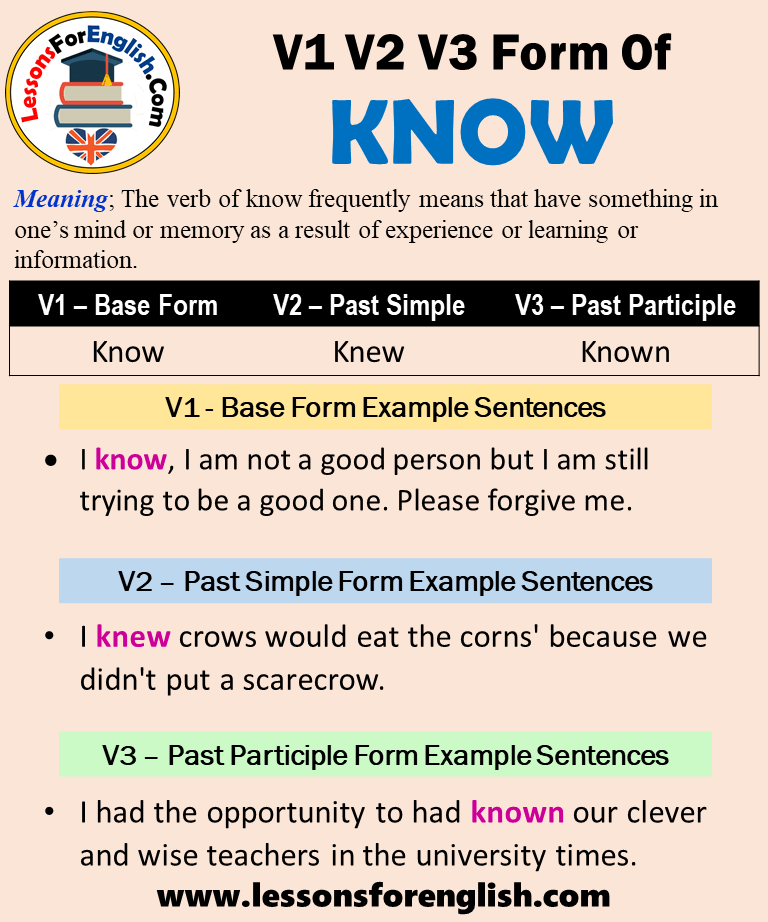
Past Tense Of Know, Past Participle Form of Know, Know Knew Known V1 V2
The past tense (past participle) form of "see" is "seen." The infinitive of the word form is "see." The present participle form is "seeing." The past tense form is "saw" and past participle form is "seen." To learn how to use these words, refer to the sentence examples provided below. Sentence examples for past tense of "see"
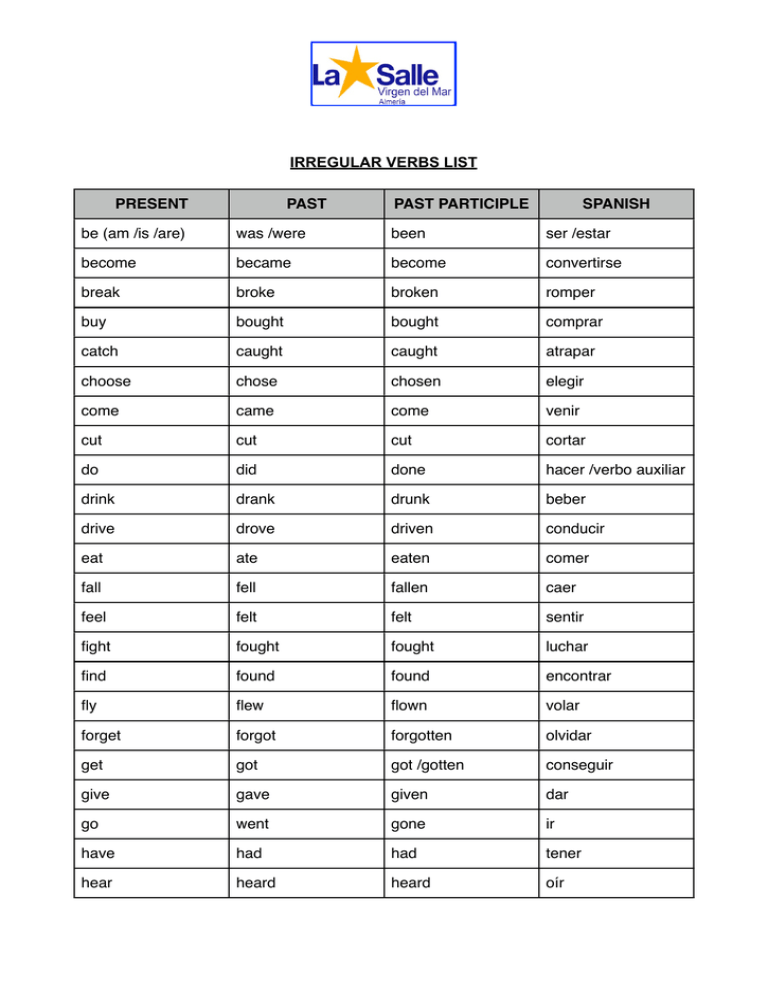
IRREGULAR VERBS LIST PRESENT PAST PAST PARTICIPLE
Verb + Preposition ABOUT List in English Verb + Preposition FOR List in English Verb + Preposition FROM List in English V3 Past Participle Since the verb 'see' is irregular, the V3 version used in conjunction with perfect tense is known as ' seen'.

50 examples of present tense past tense and past participle English
Present Perfect Continuous Tense He/She/It has been seeing. I have been seeing. You/We/They have been seeing. Simple Past Tense He/She/It saw. I saw. You/We/They saw. Past Continuous Tense He/She/It was seeing. I was seeing. You/We/They were seeing. Past Perfect Tense He/She/It had seen. I had seen. You/We/They had seen.
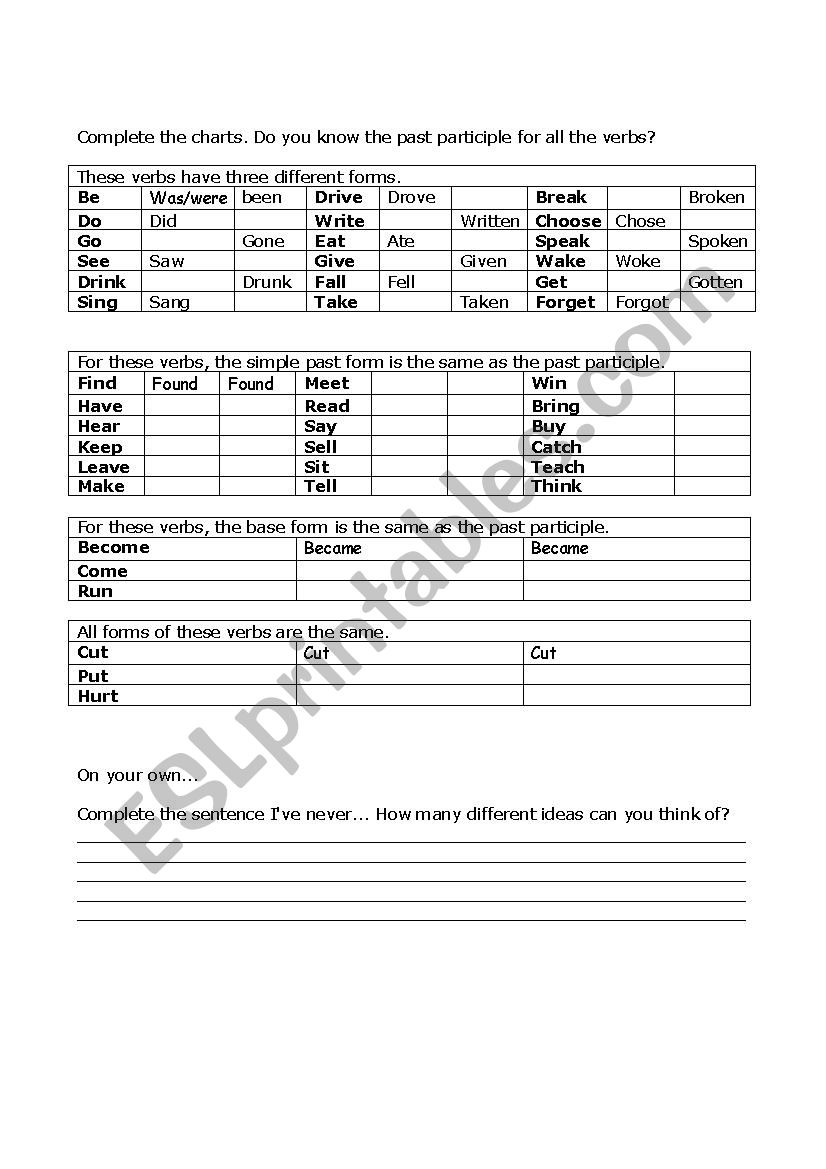
past participle verbs exercise ESL worksheet by gabigonc2
1. I her yesterday. 2. I am the doctor at 1 o'clock. 3. Nowadays, Jack his uncles every weekend. 4. We have the light! "To See" in All the Tenses The tables below show how "see" conjugates in the past, present, and future tenses. Past Tenses Present Tenses Future Tenses Most Common Irregular Verbs
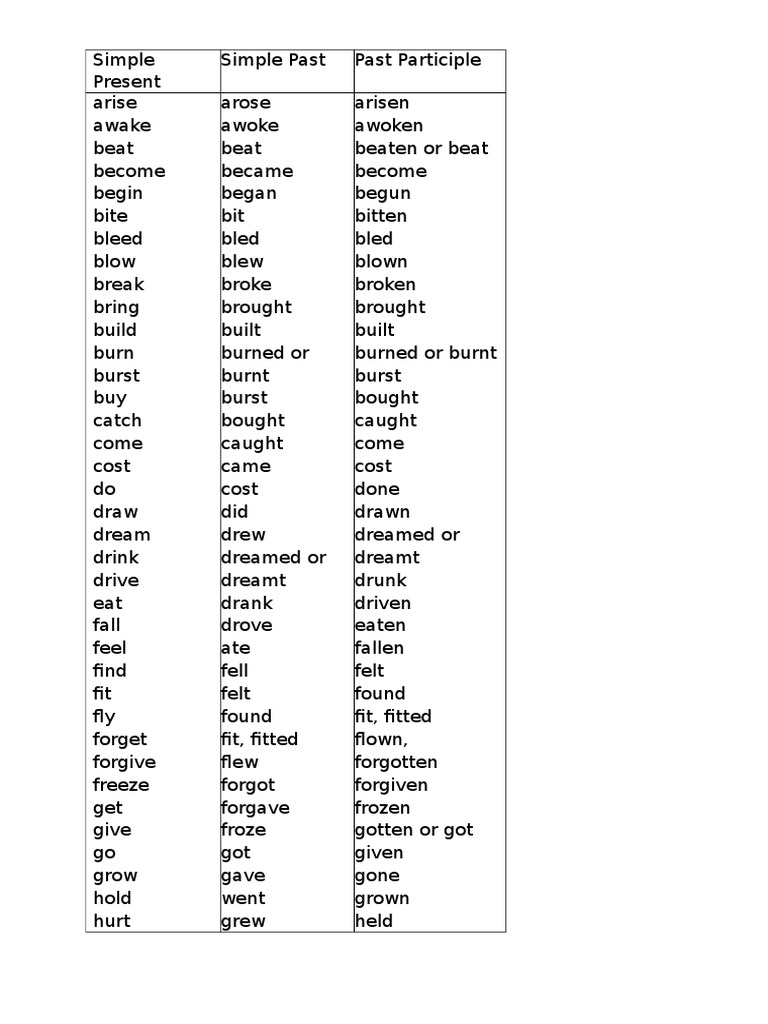
List of Verb Present, Past, Participle PDF Cakes Foods
Past participle seen Model : see Auxiliary : have, be Other forms: see oneself / not see Contractions Advertising Indicative Present I see you see he/she/it sees we see you see they see Preterite I saw you saw he/she/it saw we saw you saw they saw Present continuous I am seeing you are seeing he/she/it is seeing we are seeing you are seeing

101 Irregular Verbs Past Tense in English Woodward English
Irregular Verbs List Definition: To See Irregular verb: To See Verb conjugation: See - Saw - Seen Meaning of 'To See' To notice with your eyes Conjugation of verb 'See' Irregular Verbs Following a Similar Pattern Verbs like: UsingEnglish.com is partnering with Gymglish to give you a Want to learn about the irregular verb 'to See'?

Past Participle Grammar book, Teaching grammar, Grammar
1. To perceive with the eyes. 2. To understand something. Example (s): 1. I saw the murderer running. 2. I can't see what you mean. Similar verbs The irregular verbs in the table below have the same pattern as see. They are: - Verbs with '-en' in the past participle. - Verbs like 'write, wrote, written'. More Irregular Verbs Quick Links

Irregular Past Participle Verbs
Tenses of ' see '. . See is an irregular verb with two past verb forms, neither of which end in - ed in their past forms: saw and seen. Regular verbs end in - ed in their past verb forms, like walk/walked, talk/talked, and laugh/laughed. This makes the verb see a bit more complicated when conjugating to its past verb forms.

Past Participle Chart (one page of many) Verbs Pinterest Charts
verb us / siːn / uk / siːn / Add to word list past participle of see SMART Vocabulary: related words and phrases Using the eyes accommodate accommodation all eyes are on someone/something idiom astigmatic beholder cast chart corner discern fix glare have a butcher's idiom penetrating re-see re-sight rest on someone/something resurvey rubbernecking

50 Examples of Present Tense, Past Tense and Past Participle English
Past participle of see Past participle seen [siːn] You are look at the page for irregular verb see Participle of the irregular verb [see] The past participle is one of the most important parts of English grammar. It's used to express perfect tenses and to form the passive voice.